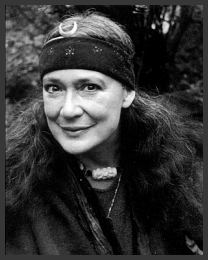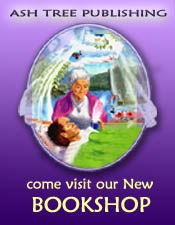Journey through menopause
interview with Susun Weed
herbalist, author, teacher, wise woman
Author revises and expands her bestselling guide on alternative treatments
By DOUG BLACKBURN, Staff writer
First published: Tuesday, February 19, 2002Times Union of Albany, N.Y.
Something happened to Susun Weed after she wrote a bestselling guide to alternative treatments for menopause 10 years ago.
Weed underwent her own midlife passage.
The Woodstock-area herbalist and lecturer has revised her book: "New Menopausal Years: The Wise Woman Way'' (Ash Tree Publishing; 304 pages;). It reflects in part the author's personal journey.
"You can tell it's the post-menopause book, because it's 50 percent fatter than the original,'' quips Weed, referring to the weight gain many women experience during this time in their life. "The first book was just 200 pages and this one's significantly more.''
It's worth noting that Weed has only added to her original work. There is nothing that she felt she had to change significantly.
WOMEN TRANSFORMED
The woman who recently celebrated her 56th birthday is as passionately pro-menopause today as she was before experiencing the change that women typically undergo at the end of their first half-century. Likewise, Weed remains opposed to hormone replacements, just as she was in 1992 when she wrote "Menopausal Years: The Wise Woman Way.''
However, Weed believes that during the past decade there has been a transformation among women in the United States.
"More and more women are recognizing that menopause is healthy for the individual woman, healthy for society as a whole and the gateway to power,'' she says. "Ten years ago, most women thought menopause was the end. The absolute end.''
Weed likes to think she deserves some of the credit for the new attitudes toward menopause. She has been writing and teaching about menopause for more than 13 years. She figures she has talked with and listened to approximately 50,000 women during that time.
SIPPING KAVA KAVA
Her book offers numerous alternative treatments for symptoms such as hot flashes. For example, Weed recommends women who are in the midst of their menopause journey avoid even a glass of wine, which is likely to trigger hot flashes.
She recommends instead drinking a "kava kava infusion,'' using the plant that's readily available at most health food stores or by mail order, and preparing a beverage by steeping it overnight.
"I know from experience, as well as from the experiences of countless other women, that kava kava is a much better social lubricant than alcohol during this time of life,'' Weed explains. "It makes you forgive your neighbor and feel jolly, just like alcohol would, but with no hot flashes.''
There is controversy, however, about the use of kava kava. According to a story in last month's New York Times, kava in capsule form has been banned in France and may be taken off the shelves in other European countries. The herbal supplement has been linked to cases of liver toxicity. The federal Food and Drug Administration is conducting its own study of kava.
Weed believes the often-dreaded hot flashes can be used as an indicator for future health.
"I can tell you how healthy a woman will be if I know how many hot flashes she has during menopause,'' she says. "If a woman has lots and lots of hot flashes, she should live a healthy, vigorous life for 20, 30 or 40 more years.
"We don't want to get rid of hot flashes,'' she adds. "Hot flashes literally create enlightenment. I don't mean this in a hippies woo-woo way. Scientifically, if you compare the pulse and EKG and other data of a person meditating in or near a state of nirvana, you will find it is similar to the condition a woman is in during a hot flash.''
As far as treating hot flashes as they happen, Weed recommends two simple techniques. One is having a person blow gently on the nape of the woman's neck as she is experiencing the hot flash. The other is to gently rub the cheekbones, starting near the nose and moving toward the ear, with a cool object or simply with your index finger.
SOY MISCONCEPTIONS
Much of the new material in her book is devoted to soy and addressing what she believes are the many misconceptions about soy. Many women, Weed says, are consuming large amounts of soy in the forms of tofu, soy milk and other food items to help with the relief of menopausal symptoms.
More recent research shows that soy milk and other soy products (with the exception of tamari, miso and other fermented soy foods) can cause thyroid problems and may also lead to an increased risk of Alzheimer's, according to Weed.
She also argues against progesterone cream, which many women use to alleviate menopausal symptoms. "I think we have a huge problem in the making,'' Weed warns. "This is the largest public health experiment with nobody tabulating the results that has gone on in several decades.''
MANY HATS
Weed wears many hats. She is an herbalist and a businesswoman who has established her own publishing company, Ash Tree. In addition to "New Menopausal Years,'' she is the author of three other books on women's health.
In 1978, she founded the Wise Woman Center, where she lives and conducts workshops throughout the year. It is located near Woodstock.
The native of California claims to have dropped out of high school in her junior year to pursue mathematics and artificial intelligence at UCLA. Weed quit college midway through her third year to pursue life.
She has instructed students at the Yale Nurse Midwifery School and at the University of Rhode Island, among numerous other institutions. Weed is also a self-described green witch, a high priestess of Dianic Wicca, and a Peace Elder who has adopted two Native American grandmothers. And she is a goat keeper.
Oscar-winning actress Olympia Dukakis heartily endorses Weed's writings on menopause.
"I'm so glad Susun Weed exists,'' Dukakis writes on the jacket to "The New Menopause.'' "Her work is vitally important.''
Reprinted with permission from: http://timesunion.com
Doug Blackburn has written for the Times Union's Life & Leisure section for
the past seven years. He writes primarily about food and spirituality and
health issues, as well as profiles of interesting people in the upstate
region. He lives in the northern Catskills.


